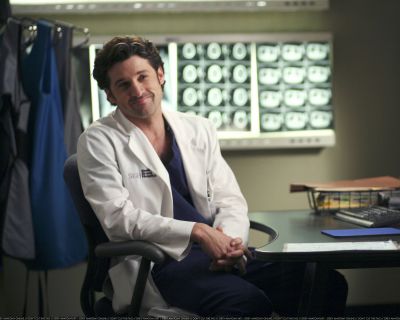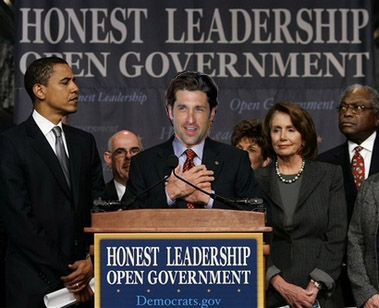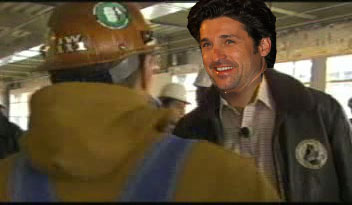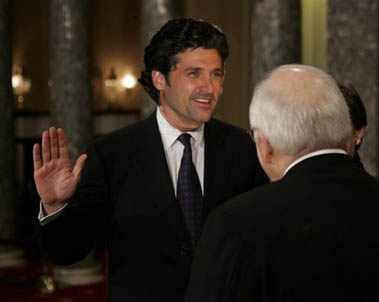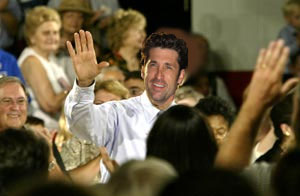Andrew Brockmeier
From Usgs
Andrew James ("Drew") Brockmeier (born July 4,1976) is the 49th Vice President of the United States.
| ||||
| 49th Vice President of the United States | ||||
|---|---|---|---|---|
| In Office: 2017 - Present President: Mason | ||||
| Preceded by | Andrew Merrilin | |||
| Succeeded by | Incumbent | |||
| Senator from the Great Lakes | ||||
| In Office: 2013 - 2016 Served alongside: Gillikin | ||||
| Preceded by | Elizabeth Wellbourne | |||
| Succeeded by | Bryan Jennings | |||
| Chairman of the Democratic National Committee | ||||
| In Office: 2007 - 2017 | ||||
| Preceded by | Howard Dean | |||
| Succeeded by | Sean Radcliffe | |||
| Born | July 4th, 1976 Ann Arbour, Michigan | |||
| Political Party | Democratic Party | |||
| Spouse | Single | |||
| Religion | Methodist | |||
Contents |
Early life
Andrew Brockmeier was born to two teachers in Ann Arbor, Michigan. His father, a University of Michigan law professor, and his mother, a high school English teacher, both instilled in Drew a passion for community service. He worked his first campaign in 1992 volunteering in the Clinton Gore campaign offices in Michigan after school. A four year class president, his class voted him "Most Likely to Succeed" in his Senior Yearbook. After high school graduation, he enrolled in University of Michigan and went on to medical school. After graduating from University of Michigan's Medical School, Drew joined Doctors without Borders for a few years. His experience in some of the poorest areas of the world helping those who had no way to get help otherwise shaped his world view. He finally returned home to teach at the University of Michigan Political Science Department for a year talking about his experiences in the thrid world. His class was so impressed that they began a "Draft Brock" campaign for their congressional seat when long time member John Dingell announced his retirement. After the students got enough signatures for him to be placed on the ballot, Drew decided he owed it to them to run.House of Representatives career (2007-2012)
First term (2007-2008)
Once taking office, Drew spent most his time that term getting used to Congress and learning the ways of Capital Hill. Working with the Democratic leadership, Brockmeier was pleased to pass an agenda for America with bipartisan support. The measures of the agenda included raising the minimum wage for the first time in 10 years, passing the 9/11 Commission recommendations, reversing the ban on stem cell research, common sense immigration reform, and other measures. Drew was also used this opportunity to introduce his own first measures of his own personal agenda. He presented plans to clean up Washington, end outsourcing of American jobs, make college more affordable, cover every child with healthcare, make prescriptions more affordable for seniors, and bring peace to the Sudan.Second term (2009-2010)
After his loss for the Senate seat, Brockmeier returned to Congress still believing in the fight he fought. His first act of business was to bring up a plan to ensure no deceptive practices hold people back from voting. He also introduced the most comprehensive plan to fight global warming as he saw the dangers a climate crisis could bring. Fulfilling a campaign pledge from his Senate campaign, Brockmeier introduced a plan to give auto makers subsidies for healthcare in exchange for the manufacturers moving towards more energy efficient cars. The other major plank of the Brockmeier agenda was protecting Social Security as it stand today while we move towards reform.
Mid way through the first year of the term was when Brockmeier began a public relations blitz to bring the Honest Leadership and Open Government to the floor. This act was Brockmeier's ethics reform package that he and others have heralded as the "most comprehensive plan in a generation." Yet when Brockmeier moved to pass it by unanimous consent, House Majority Leader John Pizzuto objected saying he wanted to see a debate. Yet the debate never came, so Brockmeier began to try and build up a grassroots surge to bring the bill to the floor. That plan started with a speech in Michigan but came to involve a national Democratic Radio Address, interviews on two cable news shows, and major blog support.The plan never came to the floor, but after the public relations push, Brockmeier legislative director, Bill Ford, leaked private memos between Brockmeier and Pizzuto that cast the affair in a whole new light. Pizzuto had pledged to bring the bill to the floor, but then revoked that pledge after he was ordered to do so by President Elizabeth Warren. Brockmeier immediately fired Ford and refused to comment on the story, known as "Memo-Gate", until the Republican attacks on him became too much to handle. His press conference on the story became a major event and showed that even as his party's leader, his independent streak still lived on.
Brockmeier closed the session introducing more plans to move America forward and with visits back to the Great Lakes. He took part in a "Hear It From the Heartland" Tour which took him through all 3 states of the Heartland region speaking about Democratic priorities the Republicans refused to bring to the floor. He also made a quick trip to a Dearborn auto plant that was shut down for the day due to the Solar Storm in the West coast. With the session nearly over, Brockmeier spearheaded the Democratic Party's tax relief plan for middle class families, a small business growth plan, efforts to stop meth, and major education reforms.Third term (2011-2012)
Fresh off a come from behind victory for the DNC, Brockmeier returned to the House ready to get back to work for the people of the Michigan 15th district. On day one, he immediately introduced more plans to help make tomorrow brighter. His agenda for the beginning of the term included expanded family and medical leave, creating new education opportunities for the unemployed, making the work place safer, giving our cops the tools they need to get the job done, and keeping firearms out of the hands of terrorists.
Brockmeier's third term was shaped, as was everyone's, around the tragic bombings in D.C. The bombing of the U.S. Capital, Supreme Court building and White House shook the nation, but Brockmeier was ready to lead. Building off his already stellar record on homeland security, Brockmeier introduced a whole litany of new items to his agenda. His plans called for increase security on our passenger and freight trains and our public transportation system, more money to our nations firefighters, the creation of a National Defense Trust Fund, and a plan to target terrorists, terrorists financing, and the countries who support terror more effectively. The Congressman also led the way with House Minority Leader Marie Evans and Senate Minority Leader Lilliam Vanleer to create the D.C. Bombings Commission. But Brockmeier also took time to be home with family, friends and neighbors to reflect, mourn, and remember those lost. He was honored to be chosen by the students to lead the University of Michigan D.C. Bombings Memorial where he said, "...America has faced dark days, but always moves forward to the brighter horizon." Brockmeier also launched a tour of Michigan to discuss his plans to strengthen homeland security and defeat terror.
Senate career (2013-2016)
First term (2013-14)
After losing another close election to the Senate, opportunity struck when Senator Elizabeth Wellbourne was selected to fill the vacancy in the Heartlands Governor region with Andrew Merrilin becoming Vice President. Governor Wellbourne called on Drew Brockmeier to fill the seat she had recently left. Brockmeier accepted, facing a firestorm of criticism and praise. Knowing the difficulty of the situation he was in, Brockmeier set out to prove himself.He immediately began by introducing legislation to help turn things around for the Great Lakes. But he also took a step not taken by anyone before. Knowing he couldn't really represent the Great Lakes without hearing from the Great Lakes. Starting in the Upper Peninsula of Michigan, Drew started a Listening Tour of all of the 83 counties in Michigan. Just a few weeks later, Drew visited all 72 counties in Wisconsin. With the completion of that tour, Brockmeier became to first elected official to visit every county he represents.
Second term (2015-16)
Having won the special election in 2014 to fill out the remainder of the term, Brockmeier got to work passing major parts of his agenda.
Vice president (2017-Present)
Drew Brockmeier was sworn in as the 49th Vice President of the United States on January 20, 2017.
Electoral history
2006 House campaign
After officially announcing his intention to run with his students at the University of Michigan, Drew started in on a long campaign. While the race turned negative with his Republican opponent criticizing his lack of a political background, Drew kept the campaign positive and spoke about his plans for office. Once the dust settled, Drew was elected with 55% of the vote to his Republican opponents 44%.
2008 Senate campaign
Main article: United States Senate elections, 2008
After much consideration, Drew Brockmeier announced his campaign for Great Lakes Senate in Detroit, Michigan citing his desire to do more and serve his friends, family, and neighbors better. He had an early lead in the polls and ran a strong positive campaign for the first half. However his lead was cut in half due to misleading attacks from his opponent Angela Chiles, so he was forced to fight back. While pointing out his record of success, he also pointed out the outrageous claims of Chiles saying it was alright for people with chronic diseases to suffer. As the race headed towards a close, nearly all expected Brockmeier to pull out a win, yet the Republican Party and Chiles pulled what was called a 'dirty deal' and transfered in $12 million to run misleading attack ads against Brockmeier. When the final results came in, Brockmeier held on to win Michigan, but by a lower margin than Chiles won Wisconsin, giving Chiles the Senate seat.2012 Senate campaign
Main article: United States Senate elections, 2012
In late 2011, Brockmeier announced he intended to run in next year's Great Lakes Senate race for the the very seat he narrowly lost just four years prior. Angela Chiles had resigned from the Senate, and Brockmeier instead faced her replacement, Senator Jason Gillikin, who was running to fill the rest of the unexpired Chiles term. Brockmeier said Gillikin was a 'defender of status-quo' and that now is time for change. Brockmeier was able to close the 4 point gap, he came up just short on election night, losing to Gillikin by .1% of the vote.2014 Senate campaign
Main article: United States Senate elections, 2014
After his successful appointment to the Senate, Drew Brockmeier announced his intention to seek election to his seat in the special election of 2014 to fill out the remainder of the term. He faced former Ford Motor Companies executive John Fallon. On election day 2014, Brockmeier won a historic victory in the Great Lakes with a 11.5% victory, becoming the first candidate to win both Michigan and Wisconsin in a single election. He also was the first Senate candidate in Great Lakes history to run a completely positive campaign.2016 Vice Presidential campaign
Main article: United States presidential election, 2016
Drew Brockmeier announced his attention to seek a second term to the Senate in late 2015. After an extremely successful term, Brockmeier was expected to cruise to victory and saw support from across the Great Lakes. Michigan Congressman Donald Wilcox announced his intention to run against Brockmeier in the summer of 2016, but before the campaign began, Brockmeier withdrew his name from the ballot for what he cited as "personal reasons" and Michigan Congressman Bryan Jennings was chosen to fill his spot on the Democratic ticket.The "personal reasons" cited by Brockmeier as he withdrew his name from the ballot became obvious a few days later when on the first day of the Democratic National Convention in Philadelphia, Pennsylvania, Democratic Presidential nominee, Appalachia Governor Whitney Mason of North Carolina, announced Brockmeier as his choice for Vice President. On the third night of the convention, Brockmeier accepted his nomination in a speech that many pundits called "spectacular."
After the convention, the Mason/Brockmeier ticket began campaigning in earnest to recapture the White House for the Democratic Party after sixteen years our of power. On election night, Whitney Mason and Brockmeier were swept into office in a landslide election.
Election Results
| Year | Office | Election | Winner | Party | Votes | % | Opponent | Party | Votes | % | ||||
|---|---|---|---|---|---|---|---|---|---|---|---|---|---|---|
| 2008 | Great Lakes Senate | General | Andrew Brockmeier | Democratic | Loser | 47.86% | Angela Chiles | Republican | Winner | 52.14% | ||||
| 2012 | Great Lakes Senate | General | Andrew Brockmeier | Democratic | Loser | Jason Gillikin (I) | Republican | Winner | ||||||
| 2014 | Great Lakes Senate | General | Andrew Brockmeier (I) | Democratic | 3,127,241 | 55.4% | John Fallon | Republican | 2,475,380 | 43.9% | ||||
| 2016 | Vice President | General | Andrew Brockmeier | Democratic | Winner | John Dunn | Republican | Loser | ||||||
Democratic National Committee Chair (2007-2017)
Draft Brock for Chair and Campaign
Upon entering Congress and the resignation of longtime DNC Chairman, Governor Howard Dean, a "Draft Brock" movement began inside the Democratic Party. After long deliberations, Brockmeier threw his hat in the ring and began working hard to win the support of party members. By the time the nomination period was over, 3 other candidates remained in the race. After a lengthy debate of their plans for the party, the Democrats selected Brockmeier by a blowout margin. After taking the podium from outgoing Chairman Dean, Brockmeier pledged to work his heart out to keep the Democratic Party moving forward.Taking Office
Moving into the office required hard work from not only Brockmeier but his entire staff. Brockmeier immediately instituted dramatic reforms to the party's communications department as well as the new member services. He began to work towards uniting the Democrats in a common goal again and with his work, the success was seen nearly immediately when the Democrats beat the odds in two election cycles in a row.
50 State Tour
One of the larger accomplishments of Brockmeier's first term as DNC Chairman was to organize and push through a 50 State Tour for the Democratic Party. Named the 'Believe in America' Tour, it saw Brockmeier attend an event in every state of the union. Along the way he was joined by Democratic leaders and rising stars for what was considered a huge success that has yet to be accomplished by any other party at any time. For more information on the tour head to www.democrats.org/believetourLeaving Office
After ten years in office, the longest in over a century, Drew stepped down as DNC Chairman in early 2017. After leading the party that was completely out of power when he started, Drew left it with control of the White House, control of Congress, and just a few thousand votes from a Governor's mansion.
External Links
- Voting Record of 111th Congress
- Voting Record of 112th Congress
- Voting Record of 113th Congress
- Senate Blog
- Congressional Blog
- Friends of Brockmeier Blog 2012 Campaign
- Friends of Brockmeier Blog 2014 Campaign
- 2008 Great Lakes Senate Race
- 2012 Great Lakes Senate Race
- Meeting with Auto Workers in Dearborn Michigan
- 'Hear It From The Heartland' Tour
- University of Michigan D.C. Bombings Memorial
- 'Strong at Home' Tour
- Autoworkers Town Hall in Warren, Michigan
| Preceded by John Dingell | Member of the House of Representatives from Michigan's 15th congressional district 2005 - 2013 | Succeeded by Unknown |
| Preceded by Howard Dean | Chairman of the Democratic National Committee 2007 - 17 | Succeeded by Sean Radcliffe |
| Preceded by Elizabeth Wellbourne | Senator (Class 1) from the Great Lakes 2013 - 16 Served alongside: Gillikin | Succeeded by Bryan Jennings |
| Preceded by Rick Hernandez | Democratic Party vice presidential candidate 2016 | Succeeded by Most recent |
| Preceded by Andrew Merrilin | Vice President of the United States 2017 - Present President: Whitney Mason | Succeeded by Incumbent |
| Vice Presidents of the United States of America |
|---|
| Dick Cheney.Elizabeth Warren.Aaron Reid.Andrew Merrilin.Drew Brockmeier · Tim Kent . Robert Hudson.Marcus Cavalier.Teddy Williams |
| United States presidential election, 2016 | |
|---|---|
| General polls · Fundraising · Debates · Endorsements | |
| Democratic Party | Primary polls · Primaries · Convention · Debates |
| Candidates | Whitney Mason (Presidential nominee)/Andrew Brockmeier (Vice Presidential nominee) · Justin Casanova-Davis |
| Withdrawn | Bryant Carter · Emmett Honeycutt · Tom Potier · Lilliam Vanleer |
| Republican Party | Primary polls · Primaries · Convention · Debates |
| Candidates | David Gamble (Presidential nominee)/John Dunn (Vice Presidential nominee) · John Dunn · Vincent Halfhyde · Andrew Merrilin · Valeria Smith |
| Withdrawn | AA Alvera · Francisco Cojuanco · Joseph Salazar-Portela |
| Other 2016 elections: House · Senate · Gubernatorial · Presidential | |

